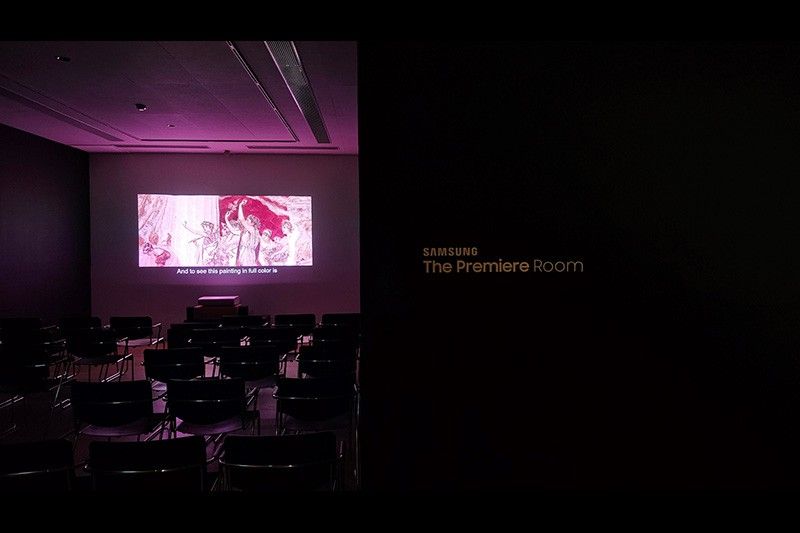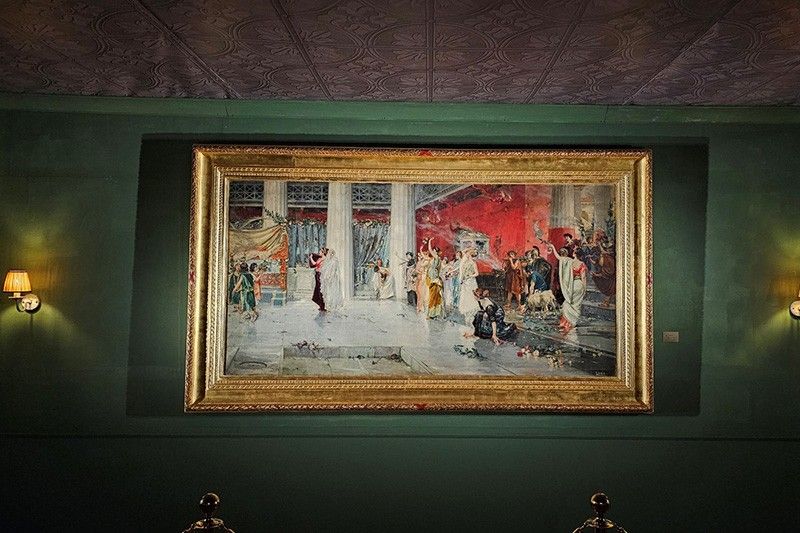Samsung debuts first ever premiere room for historic Juan Luna exhibit

MANILA, Philippines — Filipino painter Juan Luna was best-known for his "The Spoliarium," a painting which he worked on for eight months and which depicts dead and dying gladiators being stripped of weapons and garments. Submitted by Luna to the Exposiciòn Nacional de Bellas Artes in Madrid, Spain, in 1884, where it garnered a gold medal.
At a gathering of Filipino expatriates in Madrid that same year, our National Hero, Dr. Jose Rizal, toasted the triumphs of his compatriots Juan Luna and Felix Hidalgo (who won a silver medal) and proceeded to say, “Luna’s Spoliarium with its bloody carcasses of slave gladiators being dragged away from the arena where they had entertained their Roman oppressors with their lives… stripped to satisfy the lewd contempt of their Roman persecutors with their honor, embodied the essence of our social, moral and political life: humanity in severe ordeal, humanity unredeemed, reason and idealism in open struggle with prejudice, fanaticism and injustice.”
As Filipino historian Ambeth Ocampo puts it, the masterpiece’s importance lies in the fact that “when Luna and Hidalgo won the top awards in the Madrid Exposition of 1884, they proved to the world that Indios could, despite their supposed barbarian race, paint better than the Spaniards who colonized them.”
Now considered as the greatest artwork by a Filipino artist, "The Spoliarium" now hangs in the main gallery of the National Museum of Fine Arts in Manila.
But Luna’s fame as a painter did not start and end with "The Spoliarium." He had another important piece of painting which Filipino art historians and enthusiasts consider as the "holy grail of Philippine art" — "Hymen, oh Hyménée!"

Also known as "Boda Romana," the painting depicts a scene from a Roman wedding ritual, particularly the moment when the bride is entering the groom’s chamber. It draws upon the ancient tradition of invoking Hymen, the Roman god of marriage, through wedding chants. Luna commenced work on "Hymen, oh Hyménée!" in 1886, during his and wife Paz Pardo de Tavera’s honeymoon in Venice, Italy, and finished it by early 1887. It later won a bronze medal in the prestigious Exposition Universelle in Paris, France, in 1889. Luna reached his peak as an artist with this piece, thus securing his status as a master painter. He also considered it as one of his favorites and kept it in his studio.
When Luna passed away in 1899, the painting vanished.
Around 2005, Jaime Ponce de Leon, founder of the Philippine-based auction house Leon Gallery, began following leads and clues as to the whereabouts of "Hymen, oh Hyménée!" After almost a decade, his “tireless obsession” with the painting paid off. He finally found it and got to acquire it in 2014. Following a three-year authentication process, the Luna masterpiece finally made its way home to the Philippines after some 130 years. It was stored in a private facility in the Philippines, waiting for the perfect opportunity for the homecoming that it deserved.
In October 2022, De Leon finally agreed to have it publicly displayed. This year, he loaned the painting to Ayala Museum, which opened it to public viewing.
Last June 12, as the nation marked the 125th year of Philippine independence, "Splendor," the special multimedia exhibit celebrating Luna’s legacy as a master painter opened to the public at the Ayala Museum. At the heart of the ongoing exhibit is "Hymen, oh Hyménée!," considered as Luna’s opus. It is one of those rare instances when an exhibition is dedicated to an individual work of art.
As an advocate for the arts and culture, Samsung partnered with Ayala Foundation to be the official audio-visual partner of this historic event and put up the first ever The Premiere Room.
One of the exhibit’s highlights is a special documentary by Martin Arnaldo, which traces the recovery of the piece and paints a portrait of Luna that the public is not familiar with. The film plays on loop in Samsung’s The Premiere Room, which features The Premiere, a smart projector TV with a massive 130-inch screen, and the Q Soundbar, with its deep bass and nuanced sound engineering. These features work together to deliver a realistic, vibrant viewing that gives guests the chance to see the film just as the director intended it.
The Premiere’s minimal and compact body is designed with the highest level of craftsmanship, meant to blend seamlessly into Samsung’s The Premiere Room. It is complemented by the Q Soundbar with Dolby Atmos, which provides the ultimate three-dimensional audio experience perfectly calibrated for any room. Guests will be captivated by unrivaled surround sound that envelops them with heightened clarity and optimized bass.
The Premiere Room at the Ayala Museum is a testament to Samsung’s innovative technology and dedication to the arts and culture. With The Premiere and the Q Soundbar’s advanced features and capabilities, Luna’s painting is brought back to life – once thought to be lost, now found, and finally brought home where it truly belongs.
Experience "Splendor: Juan Luna, Painter as Hero" and its accompanying documentary at the Ayala Museum until December 31.





















